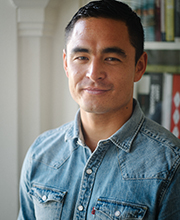
Alumni on the rise
 In the world of start-ups, success doesn’t just hinge on the strength of a business
plan or the determination of the founder. Oftentimes, who you know and collaborate
with speaks volumes to investors and potential clients. And when two alumni from UCI’s
School of Social Sciences form a partnership, both companies are one step closer to
success.
In the world of start-ups, success doesn’t just hinge on the strength of a business
plan or the determination of the founder. Oftentimes, who you know and collaborate
with speaks volumes to investors and potential clients. And when two alumni from UCI’s
School of Social Sciences form a partnership, both companies are one step closer to
success.
That was precisely the case with Andrew Bertolina and Kelsey Minarik. Though they didn’t know each other as students, the budding entrepreneurs were brought together by the UCI family and formed an unexpected collaboration—one that has helped to develop each of their growing start-ups.
For Bertolina—whose company, Finvoice, provides a platform for small businesses to auction their invoices to investors—that means generating more clients. For Minarik—who produces fashionable and functional medical supplies like compression socks through her company, RejuvaHealth—that means finding the capital to meet the costs of running a young business. And with such complementary needs, their partnership was a match made in start-up heaven.
Unexpected Beginnings
Starting a company wasn’t necessarily at the front of either founder’s mind while at UCI. Bertolina was playing tennis, pursuing a degree in economics and imagining a career with the World Bank while Minarik was busy double majoring in international studies and business management and studying abroad in Europe. But the carefree college life was rudely interrupted for the 21-year-old Minarik just as she was about to begin her junior year.
“About a week before the quarter started, I had a trip planned to New York,” she says. “During the flight there I noticed severe swelling in one of my legs and some discomfort. Initially, I thought I had twisted my ankle or done something while I was running, so I kind of ignored it and went through the whole week in New York. But it didn’t lessen, it just got worse.”
When she arrived back on the west coast she still wasn’t concerned enough to get her leg examined, but a sore throat brought her to the family physician who saw her leg and immediately sent her to the emergency room.
“So, sure enough, I went and they found I had a large deep vein thrombosis (DVT) or a blood clot in my leg,” she says.
 Part of her treatment plan was to wear compression stockings, which Minarik says offered
almost immediate relief from the pain. But as a young and vibrant college student,
she was less-than-thrilled with the boring options available. In fact, she admits
that sometimes she just wouldn’t wear them because she found them so inconvenient
and embarrassing. After an unsuccessful online search for something more stylish,
she resigned herself to wearing the bulky stockings for the remainder of her college
career. But shortly after graduation—while working as a sales and marketing manager
for a private company—Minarik started to wonder what it would take to produce something
a little more stylish herself.
Part of her treatment plan was to wear compression stockings, which Minarik says offered
almost immediate relief from the pain. But as a young and vibrant college student,
she was less-than-thrilled with the boring options available. In fact, she admits
that sometimes she just wouldn’t wear them because she found them so inconvenient
and embarrassing. After an unsuccessful online search for something more stylish,
she resigned herself to wearing the bulky stockings for the remainder of her college
career. But shortly after graduation—while working as a sales and marketing manager
for a private company—Minarik started to wonder what it would take to produce something
a little more stylish herself.
Her father, the CEO of a consumer electronics company, provided her with some valuable guidance when she first came up with the idea for RejuvaHealth. He encouraged her to make a business plan in Microsoft Excel, and after taking a look at the numbers, they realized that this idea could actually work.
“Just from kind of a natural curiosity I was like ‘well, maybe I should look at what I could buy these things for if I were to produce them,’” she says. “And it just kind of snowballed.”
While Minarik was working on getting RejuvaHealth up and running, Bertolina was cutting his teeth in the finance world. Though he had success in both venture capital and consulting in the few years following his graduation from UCI, he couldn’t shake the desire to make new connections and expand his horizons.
“I think I could have stayed in that field and had a good career and made a decent amount of money, but I felt like there were more opportunities out there,” he says.
So, he traveled across the pond to complete a specialized graduate program at Cambridge University. While earning his M.A. in finance, he began working for a venture capital firm based in the U.K., which also had a headquarters in San Francisco. This turned into a job stateside once he completed his degree, and it was there—while making cold calls and researching the world’s top entrepreneurs—that Bertolina decided that he wanted to start his own company.
“Once I had that realization, I used the rest of my time there to lay the groundwork—looking at different business ideas, doing market research, and thinking about what I’m passionate about and what I would be willing to spend five to ten years on,” he says. He had first considered the idea of small business financing as a UCI student, where he imagined himself working for an organization like the World Bank to help people in emerging markets. So, when the idea came up again at his new firm—after seeing the lack of funding for micro businesses in developing nations like India and Latin America—he knew he was on to something. From there, he decided to morph the concept to aide businesses stateside and Finvoice officially launched just over one year ago.
Described by Bertolina as an “eBay for invoices,” Finvoice customers are able to post their invoices to be bid on by investors. This allows the company the keep their doors open while they wait to get paid by clients.
“Finvoice is sort of an evolution of this passion I had for helping people through development economics,” Bertolina says. “Small businesses typically get paid in 50 to 60 days according to the Small Business Association. They have to pay their employees every two weeks and they have to buy supplies for their business, so a lot of them don’t have the capital on hand and they go out of business because they’re waiting for payments.” Offers are based on their clientele, and the more times a company uses the service, the less expensive it becomes for them.
“This has been an evolution for almost a decade, beginning with studying economics at UC Irvine,” he says.
A Meeting of the Minds
As their two very different ventures expanded, both anteaters were looking for the
best ways to make their businesses last for the long haul. Minarik was working on
fulfilling large orders of her compression stockings for companies like Brookstone,
and Bertolina was compiling a dream team to get Finvoice up and running. Then, in
2014, an on-campus alumni panel brought the two together.
Organized by UCI social sciences lecturer Seymour Schlosser—mentor to both Minarik and Bertolina, this alumni business panel gave each of them a chance to discuss their experiences in the business world with current students.
After hearing Minarik speak on the struggles of financing the large orders during
the panel, Bertolina—who was looking for pilot customers at the time—approached her
about working together.
“I spoke to Kelsey about what we were doing and explained that we were looking to
test the model, and she agreed to be one of out pilot customers,” he says. “We owe
companies like RejuvaHealth and Kelsey a lot, because in the early days people really
have to believe in you to work with you. So we’re really thankful for that.”
Since then, RejuvaHealth has been a repeat customer, and Finvoice even recently posted a case study about Minarik and her company on its website. Now, both businesses are booming. Finvoice has experienced impressive growth since it incorporated last September, growing both its client base and its team (which even includes another UCI alumnus).
As for RejuvaHealth, the company was named one of the “Top 30 Startups to Watch” by Entrepreneur Magazine in 2014 and has recently partnered with Dr. Comfort—a leading orthopedic shoe provider—to expand their products to clinical medical channels.
“It’s been amazing and validating,” Minarik says. “I feel really lucky because one of the most rewarding things are the calls we get everyday from people who we’re helping to make their lives a little better.”
Learning on the Job
Though they have both settled into their roles as founders, there have absolutely been some bumps in the road. But the result is that they both have great advice for up and coming entrepreneurs. For Minarik, coming to terms with the fact that things will go wrong was a big part of the learning process.
“One thing that can be a caveat with entrepreneurs is they all think ‘I have the best idea and I know everything.’” Minarik says. “But the beauty about being an entrepreneur is that you quickly learn that you know nothing.”
This can be a hard concept for recent graduates to accept, especially at a school like UCI that is home to such high performers. She suggests that undergrads learn as much as they can from faculty while that expertise is easily accessible. But she cautions that no matter how well you prepare, you’re never going to build a successful company without taking a few missteps.
“As a student it’s so easy to get caught up in the worry of the grades,” Minarik continues. “But the other thing about being an entrepreneur is that you’re going to screw up even when you give your 100 percent.”
Because of the nature of the business world, she notes that it’s important to prepare, but to also let those mistakes and problems that arise act as teaching moments instead of becoming discouraged. Bertolina seconds that sentiment and notes that it takes a special kind of person to build a company from the ground up.
“Founders can be wild people at times,” he says. “The term people throw around is ‘irrationally optimistic.’ You have to think that things are going to succeed even when you don’t know where you’re going to find your next customer. There’s a lot of uncertainty. So you have to have a risk tolerance, but you also have to be very optimistic that things will work out.”
Of course, it doesn’t hurt to have a network of talented classmates to call upon from time to time. And as both of these alumni will surely be in their businesses for quite a while, there may be even more anteater collaborations to come.
—Bria Balliet, School of Social Sciences
pictured: (top left) Kelsey Minarik. (top right) Andrew Bertolina. (bottom right) RejuvaHealth product line.


connect with us